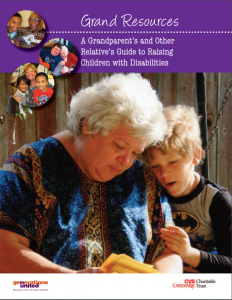 Download the Full Report
Download the Full Report
Are you a grandparent or other relative raising another family member’s child? You are not alone. Grandfamilies – or extended family members and close family friends and the children they raise – are growing in numbers. More than2.7 million children are being raised in grandfamilies without any parents in the home. Although we don’t know how many, we believe many of the children in grandfamilies have disabilities or special needs. Often they may have disabilities because of the situations that led to them being cared for in a grandfamily. Some of them may develop disabilities if they do not receive services to help them while they are young.
The guide seeks to answer some of the most often asked questions from grandfamilies like yours who have children with disabilities. When answering, we will give basic information about the major programs that can help you and your family. For example, as a first step, you may want the child evaluated to learn more about their physical or mental health challenges so you can get help. This guide will explain that process. The guide also goes over questions concerning monthly cash payments, health insurance, and other public services that may be available to help you and the child you’re raising. For example, we’ll explore how to get early intervention services for children birth to age 3, and preschool and special education and related services for older children. This guide also has a resource section that tells you where you can go to find more information and get help.
Each of the programs mentioned in this guide has rules to identify which children and families can get help. The rules often vary depending on where you live. So, you must always check the program rules in your area. Some program rules are based on the kind of disability the child has. Others are based on how much money your family has. Virtually none of the programs require that you have legal custody, guardianship or have adopted the child; the guide will tell you if any of those legal relationships are necessary for a particular program. That’s not to say that you won’t have to prove through documents like birth certificates and income tax returns that you are raising the child full-time and/or are related in some way to the child. Most of the programs will help you if you are related in any way by blood, marriage or adoption to the child. For that reason, we answer questions from many kinds of relatives, but know that the answer also usually applies to you if you are related in any way. Many of the programs will also help you if you’re a godparent or close family friend raising the child. If this is you, ask if the program includes you. Whether you’re included may depend on how “relative” is defined for a particular program.
It is probably going to take a lot of time and effort to apply for some of the programs in this guide. We think you’ll find the effort to be worth it. You should get some much deserved support to help you meet the needs of the grandchild, niece, nephew, sibling or other family member who you’re raising.